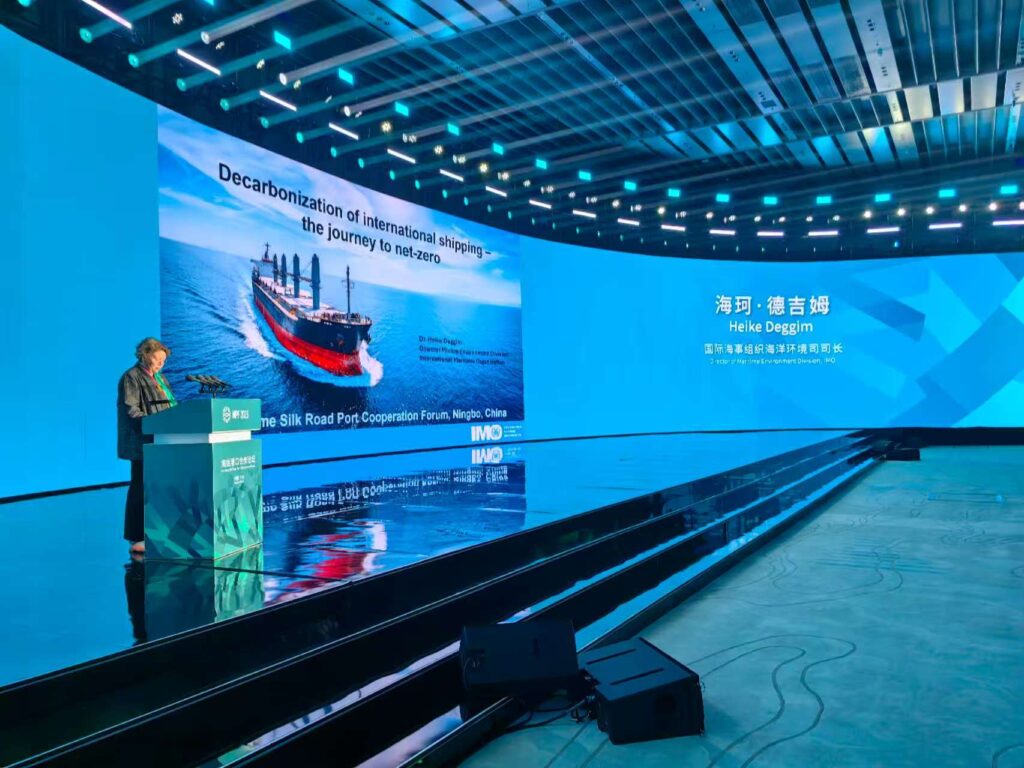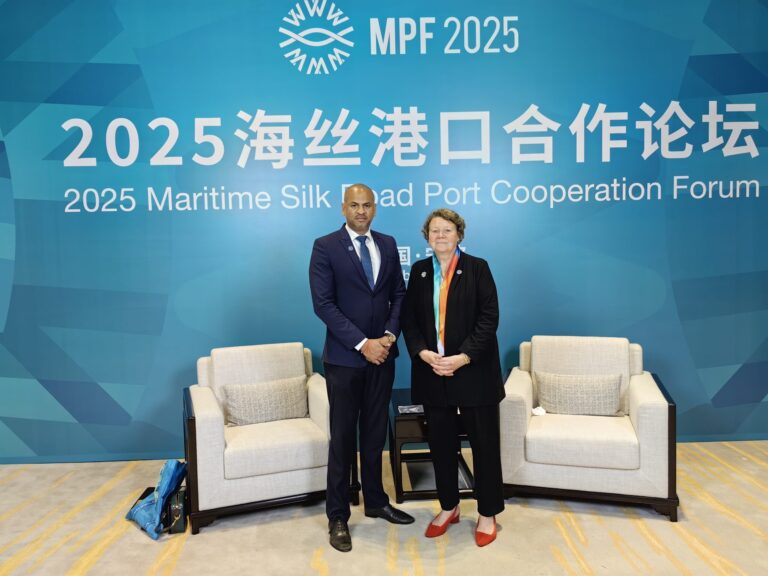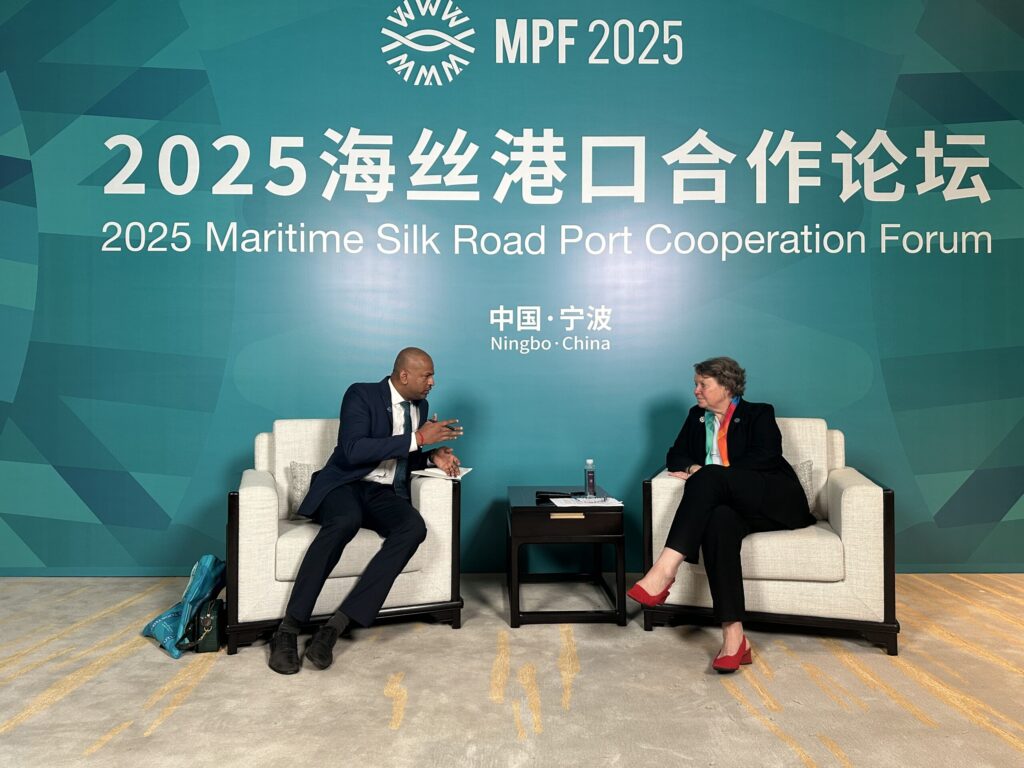Is the IMO's GHG Strategy Legally Just and Globally Fair?
The IMO’s GHG strategy, along with its technical and operational measures to reduce emissions from ships, could significantly increase global shipping costs. These added costs are likely to be passed on to shipborne commodities such as food, energy, and medicine placing a disproportionate burden on Least Developed and developing countries. This is particularly unjust given that these nations have contributed little to greenhouse gas emissions historically and continue to emit far less than developed nations today. However, IMO is hopeful to being forward an inclusive legal framework with cooperative innovation in spearheading the maritime community toward a just and sustainable future.
China – 28 May 2025 – The 2025 Sea Silk Forum for Port Cooperation, the Sea Silk Forum 2025, formally commenced on May 27th at Ningbo International Convention Centre, Zhejiang Province, under the theme of “Green Sharing, Smart Connectivity (Go Green, Go Intelligent).” The four-day forum (26–29 May) gathered over 1,000 delegates from 900 institutions and firms in more than 40 countries and regions. Organized in a “1 + 2 + N” mode, with an overall conference, two themed sub-forums, and a number of parallel events, the forum facilitated in-depth discussions on port and aviation development, trade connectivity, green logistics, and green standards. The objective was to promote world collaboration and standards coordination towards sustainable development of the port and aviation industries. To this end, the Maritime Partnership Forum (MPF) was among the key tracks of the Sea Silk Forum and involved international maritime actors in Ningbo-Zhoushan Port, which is among the world’s busiest ports with over 1.2 billion tonnes of cargo annually.

On the occasion, Yasiru Ranaraja of BRISL had a one-on-one conversation with Dr. Haike W. Deggim, Director of Marine Environment Division, International Maritime Organization (IMO), discussing differences on the legal and equity factors of the IMO’s revised Greenhouse Gas (GHG) Strategy. Dr. Deggim introduced the 2023 Revised IMO GHG Strategy, adopted at MEPC 80, with ambitious decarbonization targets: net-zero GHG emissions from international shipping by or around 2050, and along the way, at least 20% reduction by 2030 and 70% reduction by 2040 compared to 2008 levels. Key components include a lifecycle well-to-wake fuel strategy, a mix of mid-term technical and economic measures, and an aspirational GHG pricing policy linked to a Net-Zero Transition Fund to finance the Global South. As part of the IMO’s commitment to robust climate governance, the Data Collection System (DCS) was highlighted as a critical transparency mechanism. Under the DCS, ships over 5,000 gross tonnage engaged in international voyages must collect and report data on fuel oil consumption, distance traveled, and hours underway. Since its implementation in 2019, over 30,000 ships have reported annually, allowing the IMO to monitor industry-wide emissions trends and shape evidence-based policy (IMO, 2024).
Complementing global efforts, Dr. Deggim also acknowledged the growing integration between IMO standards and regional initiatives like the European Union Emissions Trading System (EU ETS). From January 2024, the EU ETS has formally included CO₂ emissions from large ships entering EU ports. While the IMO respects sovereign decisions, she underscored the potential risks of fragmented regional schemes, stressing the importance of coherent and harmonized global action in line with the United Nations Convention on the Law of the Sea (UNCLOS) and other international legal instruments.
During discussions on decarbonizing global shipping, Yasiru Ranaraja raised concerns from the Global South about rising compliance costs associated with emissions regulations that could drive up prices in essential sectors such as medicine, food, and energy. He stressed that such strategies risk disproportionately disadvantaging shipping lines from developing nations, thereby exacerbating global economic inequalities. At the heart of the argument lies the principle of Common But Differentiated Responsibilities (CBDR), a foundational element of international environmental law. Yet, as seen in recent MEPC sessions, several member states continue to strongly advocate for the No More Favourable Treatment (NMFT) principle. While vital for regulatory enforcement, its blanket application to climate measures risks marginalizing CBDR and the differentiated capacities of developing nations.
Global South advocates have called for stronger inclusion of Least Developed Countries (LDCs) and Small Island Developing States (SIDS) in shaping maritime climate policy, urging that any transition to green shipping must be equitable, inclusive, and mindful of differentiated capabilities lest it become another tool that entrenches global inequality. Ranaraja also posed a question on the structural deficit in both capacity and regulation between developed and developing world stakeholders, an issue observed during MEPC negotiations. In response, Dr. Deggim reconfirmed IMO’s commitment to an equitable energy transition, emphasizing that the upcoming Net-Zero Transition Fund seeks to redirect funds toward clean energy and green technologies in developing nations.
In her remarks, Dr. Deggim also identified emerging clean technologies as essential pillars of decarbonization, including ammonia, methanol, hydrogen, and small modular nuclear propulsion systems. The IMO is also prioritizing the development of Zero Emission Vessels (ZEVs) and bolstering investment mechanisms to accelerate innovation and deployment. These steps aim to create a robust regulatory environment that can support the maritime sector’s alignment with the Paris Agreement and the UN 2030 Agenda for Sustainable Development. While praising the EU ETS as a bold leadership example, she emphasized that regional actions must not replace international legal coherence. “Regional fragmentation could lead to compliance gaps, market distortions, and legal uncertainty,” she warned, reinforcing that IMO remains the only global forum equipped to govern maritime climate regulations with universal legitimacy.
Dr. Deggim further acknowledged China’s influential position in maritime decarbonization by way of green shipbuilding leadership, contribution to IMO discussions, and its responsible engagement at IMO meetings. China’s proactive implementation of Energy Efficiency Existing Ship Index (EEXI) and Carbon Intensity Indicator (CII) measures in its maritime fleet was cited as a best-practice model for large developing nations. Despite the concerns about rising costs, IMO’s GHG strategy, along with its technical and operational measures, is expected to set a new precedent for global maritime climate governance. As emphasized in her closing remarks, the goal is not only to reduce emissions but to “ensure that the clean energy future of shipping is accessible to all nations, fair to all stakeholders, and resilient in the face of global challenges.”



